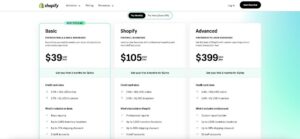Clickfunnels vs Shopify, both are amazing platforms for online businesses, but choosing the right one that fulfills your requirements plays an important role.
What is Shopify
Shopify is a trusted e-commerce platform that provides various tools and features to businesses that help them create their online store without any technical expertise. There are many features Shopify provides which including
- SEO and Marketing Tools
- Free and paid website templates that are easily customizable
- Shopping Cart
- Top-level security
- Inventory management system
Key Features of Shopify
- Shopify provides various themes and templates that give businesses a variety of options to businesses to create a unique online store.
- Shopify provides an easy product management system that allows you to easily edit, add, and organize products and inventory on different levels.
- Shopify gives various payment options that include PayPal, credit card, debit card, and more.
- Shopify offers a Shopify app store feature that offers various third-party apps and plugins that you can use to customize your website, generate leads, and increase revenue.
- Shopify offers SEO and marketing-friendly tools and templates that reduce your time and efforts.
What is Clickfunnels
Key Features of Clickfunnels
- Integration of email marketing
- Funnel templates
- A/B testing,
- Marketing automation tools
- Drag and drop interface
Clickfunnels Vs Shopify: Key Feature Comparison
Purpose and Use Case
ClickFunnels: Clickfunnels is primarily used for building sales funnels, marketing, and lead generation. It’s an amazing platform for entrepreneurs, marketers, and online-based companies that have a rigorous sales funnel process set up (landing pages, opt-in forms, and checkout pages).
It is the Best platform for businesses that want to walk visitors through a series of pages to turn them into leads or paying customers.
It helps build high-converting pages and automate marketing tasks (newsletter, upsells, and order bumps).
Shopify: Shopify is an amazing eCommerce platform with all the features for selling physical and digital products online.
This platform is best for merchants who want to create a comprehensive online shop to manage their inventories, payments, and shipping.
It emphasizes e-commerce capabilities and features for displaying product details, fulfilling orders, and increasing sales.
Features
ClickFunnels
Funnel Builder: You get a drag-and-drop funnel builder as well to build personalized sales funnels from opt-in pages, landing pages, checkout pages, and a lot more.
Email Marketing: Built-in email marketing autoresponder (with Actionetics) for follow-up auto-responder emails, segmented leads for you.
AB Testing: The ability to A/B test different funnel variations to increase conversions.
Affiliate Marketing: Run Affiliate Marketing with Backpack
Upsells & Downsells: Seamlessly add upsells and downsells while checking out
Membership Websites: This enables you to create membership areas for your content.
Shopify
E-commerce Platform: Provides an end-to-end tool for creating, running, and growing an online store.
Product Management: Add and categorize products quickly, monitor stock, and offer different product varieties.
Payment Gateways: Integrated payment processing (Shopify Payments) and alternatives including PayPal, Stripe, and more.
Shipping & Fulfillment – Tools to manage shipping, taxes, & order fulfillment
Themes & Templates: Tags and Templates for a Branded Online Store
App integrations: Access to an expansive app marketplace to extend store functionality (e.g., dropshipping, customer support, advanced marketing).
SEO & Marketing Tools — Integrated SEO features, advertising integrations, and tools to help drive traffic to your online store.
Target Audience
ClickFunnels: Clickfunnels is an ideal platform for marketers, coaches, consultants, & online course creators who want to build funnels, grab leads, & sell services or info-products.
It’s a great platform for selling digital products as part of your digital marketing strategy with upsell opportunities.
Shopify: Shopify is Ideal for stores, entrepreneurs, and shops that sell tangible goods online.
Well suited for e-commerce-oriented businesses, including fashion, electronics, and other product-focused category businesses.
Lead Generation
ClickFunnels: ClickFunnels excels at lead generation. Its primary toolset includes:
Landing pages: Pre-built templates optimized for lead capture (e.g., opt-in pages, squeeze pages)
Forms and Surveys: Helpful for quickly gathering emails, collecting customer data, or asking questions.
Email Marketing: Integrated autoresponder capabilities to help follow up with leads, nurturing them until they’re ready to purchase.
One Click Upsells: Boost conversions post lead capture with simple upsell or cross-sell offers.
These features enable you to create and nurture leads by using customized sales funnels that lead prospects through a step-by-step process toward purchasing.
Shopify: Although lead generation is not Shopify‘s primary focus (like Click Funnels), it still offers:
Email Collection: Using tools like Klaviyo or Privy, you can set up popups or forms to collect email addresses for lead nurturing.
Discount codes and offers can motivate leads who would otherwise not have joined your email list or made a purchase.
Shopify Plus: Has better integrations for more advanced lead generation and funnel tools (this would be for larger businesses), such as advanced email automation, but still not as seamless as ClickFunnels’ in-built funnel capabilities.
Lead Gen Verdict: ClickFunnels is more focused on effective lead generation, while Shopify has some basic lead-gen features geared toward capturing visitors who may eventually buy something.
Product Management
ClickFunnels: ClickFunnels does allow you to sell products, but product management is not its primary feature. It allows for easy product creation within your funnels (such as for digital products, services, or physical products) but lacks advanced features for managing large inventories or multiple product categories.
Product creation within funnels is relatively simple.
For physical products, you will need to integrate with third-party services or tools to handle inventory, shipping, etc.
Shopify: Shopify is built specifically for product management. It enables you to: Define and describe your products, upload images, define variants like size and color, and assign SKUs.
Sort your products into collections, categories, and tags – it’s like organizing your store. Use CSV files to bulk import/export products. The inventory is fully tracked – you know the levels are updated automatically when a product is sold or restocked.
Digital products: Digital product sales are also easy on shopify with automated product delivery once the purchase is complete.
Verdict: When it comes to managing a large product portfolio of physical and digital products, Shopify is the way to go.
Pricing
Both platforms have a competitive pricing tag
Clickfunnels: Clickfunnels has two pricing plans, which include Startup and Pro. The startup plan will cost you $81/ month, and the pro plan will cost you $248/ month.
Shopify: The basic plan of Shopify starts at $39/month, the standard Shopify plan is $105/month, and $399/month for the advanced plan.
ClickFunnels is Best For
Users who need a complete sales funnel builder that eliminates programming complexity should select Clickfunnels. The tool provides an excellent solution for business people as well as marketing experts to create landing pages alongside sales pages and email follow-up sequences without needing any programming expertise.
Users who want to optimize the sales procedure that leads potential customers from lead capture to final sales can implement ClickFunnels’ editable template funnels for guiding customer interaction at each sales stage.
The platform excels for businesses entering new product launches, running webinars, or advertising digital products, which include online courses or membership, because it features specialized funnel templates.
Businesses leverage ClickFunnels because all their marketing automation needs payment processing and affiliate management capabilities unite in one platform, which results in saving time and eliminating multitudes of third-party applications.
ClickFunnels provides a strong option for growing businesses because its automatic funnel system, together with precise performance analysis, helps boost marketing efficiency. The platform serves as an expensive solution that might not work well for basic website needs or limited-budget operations at smaller businesses.
Shopify is Best For
Shopify offers an excellent solution to launch online stores that operate efficiently for inexperienced users. The platform works for any business size, including both small new ventures and established companies that want to make online sales of physical or digital items.
Each Shopify subscription gives businesses a comprehensive solution that includes adjustable storefront designs and secure payment solutions, together with inventory system control and self-managing marketing resources, which facilitate email outreach and social media connection.
The platform delivers maximum value to business owners who need to establish an e-commerce store effortlessly through its simple drag-and-drop interface, which grows with your requirements.
The Shopify application supports different integration packages that provide additional functionality, including shipping options, along with accounting programs and customer care platforms.
To maintain future business growth and expand the product line, Shopify provides a framework that supports higher enterprise volume, including increased site visits and transaction volumes.
Businesses that rely on reliable support will find value in Shopify because of its combination of 24/7 customer service together with an active online community.
Shopify might not be suitable if you need an affordable solution or a simple website without extensive e-commerce requirements, since it charges fees and transaction costs.
Conclusion
Both ClickFunnels and Shopify operate as strong tools, yet they function for various business needs. The primary strength of ClickFunnels lies in its sales funnel functionality, which makes it specifically for marketing professionals who need conversion enhancement and user pathway optimization. The platform offers the best solution for businesses that run lead generation and sell digital products. Businesses requiring a complete online store with inventory tracking, along with payment processing and product listing capabilities, should choose Shopify, as Shopify serves those needs. Your business objectives determine whether ClickFunnels fits better than Shopify because ClickFunnels handles sales funnels optimally, yet Shopify manages a more complete e-commerce solution.











